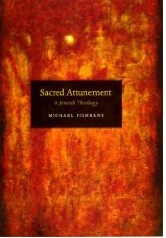I have a number of favorite Jewish writers, including may favorite essayist Joseph Epstein. When it comes to the depths of spirituality, very few plumb the depths in their own way like Abraham Joshua Heschel and his two-volume set The Prophets has no rival. As a seminary student I was stunned into thoughts and ponderings by the philosopher Martin Buber by reading I and Thou. Biblical specialists all know of Michael Fishbane’s unsurpassable Biblical Interpretation in Ancient Israel, a landmark book that demonstrated that the Old Testament was an ongoing set of hermeneutical conversations of one author with previous authors. That idea is behind my own suggestion that the authors of the Bible tell “wiki-stories” of the Story.
All this to say that Fishbane’s newest book ranks up there with Heschel and Buber for me. His book might be called a “spirituality of hermeneutics.” The title is: Sacred Attunement: A Jewish Theology
. Rarely do erudite scholars venture to explain to us their inner beliefs, but in this book Fishbane does for his children what Solomon did for his. Only Fishbane’s approach is to pass on a thoroughly Jewish theology shaped by the inner workings of hermeneutics.
 What do you think of the word “attunement” as an image of a life lived before God in this world? What do you think of his concept of Torah kelulah? (Anything like this in the Christian faith?)
What do you think of the word “attunement” as an image of a life lived before God in this world? What do you think of his concept of Torah kelulah? (Anything like this in the Christian faith?)
It is unfair to Fishbane to dip into his book to give you only a taste but blogging through the book would be even more difficult.
A major point of the book is that theology is an act of a human being seeking to be attuned with the Sacred, with God, with the divine. It is done in this world, in embodied forms, and it bears all the marks of the finitude of life on earth. So theology sees in the everydayness of life a fissure or crack and sees God at work — in this sense Fishbane’s ideas here border on Eastern Orthodoxy’s sense that all of life is “iconic.” We are called to be alert or attuned to this way of seeing life — and the person who sustains this theological vision of reality is doing theology.
Fishbane sees God’s communication and presence with us in three forms and this is the central set of principles for his theology, for this book, and for his spirituality. God speaks in:
Torah kelulah: hard to define; God’s ongoing presence, general revelation, and gracious love that we witness in everything if we are “attuned” to it. This is prior to and behind and through and in front of everything else. It is larger than Written Torah. The fullness of Torah Kelulah is unsayable. Behind this idea is the belief that God is always present, effecting his presence and grace and love in everything — and he means everything. (Perhaps a kind of panentheism but also clearly he has a sense of all of life as “iconic.”)
Torah she-bikhtav: the Written Torah. Scripture. But this is crucial: Scripture itself is ongoing record of Israel’s “instantiation” of the Torah kelulah. It is the primary, primordial witness to the “unsayable”. This is covenant script but it is a record of Israel’s momentary glimpses of the Torah kelulah.
Torah she-be’al peh: the Oral Torah. This is the ongoing expression and development of the Written Torah and it, too, is an instantiation of the Torah kelulah in light of the Written Torah.
A theological life, and he means by this what many today would call “spirituality,” is the capacity and willingness and surrenderedness in the everyday existence we all live to say “Here I am” to the divine “I will be who I will be.” The faithful (emunah) way of living this life is to recognize each of the above: that God’s presence is at work in Scripture to shape Israel and in the Oral Torah so that the faithful Jew today can discern how to live.
But all theology attempts to bridge the “all-illimitable divine reality” and the “human task of shaping it into forms of human value” and language. He has long sections on derash as the human attempts to put into words what is ultimately unsayable.
Theology then is what might be called “verbal faith.” Why?
Catch this: “If all the world were ink and all our speech quills, and if we were ever able to denote all that we and the entirety of humankind has ever thought and felt about divine reality, could we ever truly express or indicate God?” … “The arcs of speech are thus always curving toward the mystery of expression …”. And now a stunning (apophatic) conclusion: “As the curve of speech bends toward the transcendent, this truth becomes ever more unsayable” (141).

